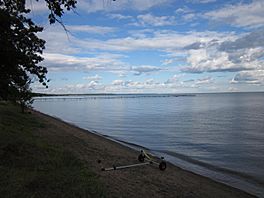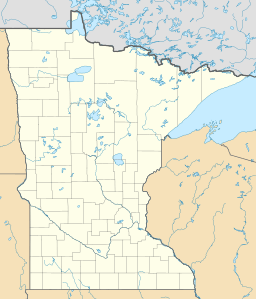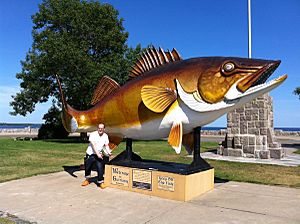Mille Lacs Lake facts for kids
Quick facts for kids Mille Lacs Lake |
|
|---|---|

Lake in September 2011
|
|
| Location | Aitkin / Mille Lacs / Crow Wing Counties, Minnesota, US |
| Coordinates | 46°14′17.27″N 93°38′36.29″W / 46.2381306°N 93.6434139°W |
| Type | moraine-dammed lake |
| Primary inflows | Garrison Creek, Seguchie Creek, Peterson Creek, and Thain's River |
| Primary outflows | Rum River |
| Basin countries | United States |
| Surface area | 132,516 acres (207 sq mi; 536 km2) |
| Max. depth | 42 ft (13 m) |
| Surface elevation | 1,251 ft (381 m) |
| Settlements | see list |
Mille Lacs Lake is a big, but not very deep, lake in the state of Minnesota, US. It's about 75 miles north of the Minneapolis-St. Paul area. The lake is located across three counties: Mille Lacs, Aitkin, and Crow Wing.
The name Mille Lacs comes from French and means "thousand lakes." The native Ojibwe people, who have lived here for a long time, call the lake Misi-zaaga'igan, which means "grand lake."
Contents
Exploring Mille Lacs Lake: Size and Features
Mille Lacs is Minnesota's second-largest inland lake. It covers about 132,516 acres (536 square kilometers). The deepest part of the lake is about 53 feet (16 meters). However, most of the lake is shallower, usually between 20 and 38 feet deep.
You'll find many gravel and rock areas, especially in the southern part of the lake. In the middle of the lake, there are two islands. These islands are part of the Mille Lacs National Wildlife Refuge. This refuge is the smallest one in the US.
Fishing Fun at Mille Lacs Lake
Mille Lacs Lake is a very popular spot for fishing. You can fish in shallow areas around the edges of the lake. There are also deeper spots with gravel and rocks in the south. In the northern part, you'll find many "mud flats" where fish like to hang out.
Many local fishermen have special names for different parts of the lake. Spirit Island is a small island in the southwest. It's made of pink and white granite rocks that have been shaped by weather. Spirit Island is one of the two islands in Mille Lacs Lake that are protected as a National Wildlife Refuge.
Fish Species in Mille Lacs Lake
The lake is home to many different species of fish, including:
- Walleye
- Northern pike
- Muskie
- Jumbo perch
- Smallmouth bass
- Largemouth bass
- Black crappie
- Burbot
- Tullibee
Mille Lacs is one of Minnesota's most loved fishing lakes. In winter, thousands of ice fishing houses appear on the frozen lake. It's also a very important place for walleye to lay their eggs. Billions of walleye eggs and baby fish, called fry, are produced here every year. Because the lake doesn't have a strong temperature layer (called a thermocline), fish can move freely throughout the entire lake.
A Look Back: History of Mille Lacs Lake
Archaeologists have found signs that people lived around Mille Lacs Lake a very long time ago. It's one of the oldest known places where humans settled in Minnesota. The Rum River flows out of Mille Lacs Lake and connects to the Mississippi River further south, near a town called Anoka.
Names Through Time
On old French maps, the lake was sometimes called Lac Buade or Minsisaugaigun. A map from 1733 by Henry Popple showed it as "Lake Miſsiſsucaigan or Baude." Even as late as 1843, US government maps called it "Mini Sagaigonin or Mille Lacs."
The Dakota people know the lake as Bdé Wakháŋ, which means "Spiritual" or "Mystic Lake." The Mdewakanton group of the Santee Sioux were named after their home around this lake. In Ojibwe, the lake is called Misi-zaaga'igan megwe Midaaswaakogamaakaan, meaning "Grand/Great/Big Lake in the Region of a Thousand Lakes." Or simply Misi-zaaga'igan ("Grand Lake"). The French also called it "Mille Lacs Lake" (Lac des Mille Lacs) because the area around it was known as the "Region of Thousand Lakes" (Pays des Mille Lacs).
Protected Areas and Communities
Around the lake, you'll find state parks that protect the land and are open to the public. These include Father Hennepin State Park and Mille Lacs Kathio State Park. Parts of the Mille Lacs Indian Reservation, which belongs to the Mille Lacs Ojibwe tribe, are also located along the lake's edge.
In 2013, a strong wind pushed a large wall of ice from the lake onto the shore. This event, called an ice shove, caused damage to some houses along the lake.
Towns on Mille Lacs Lake
- Garrison, Minnesota
- Isle, Minnesota
- Malmo Township, Minnesota
- Onamia, Minnesota
- Vineland, Minnesota
- Wahkon, Minnesota
- Wealthwood Township, Minnesota
See also
 In Spanish: Lago Mille Lacs para niños
In Spanish: Lago Mille Lacs para niños
 | Chris Smalls |
 | Fred Hampton |
 | Ralph Abernathy |



